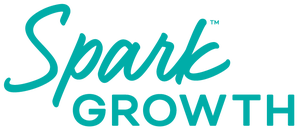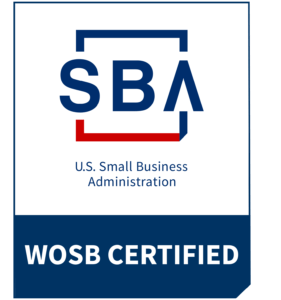Below is vocabulary that encompasses the language of Spark Growth, some of which was refined through the fire of experience.
Adaptive Leadership: facilitates a learning and growing organization to navigate volatile, uncertain, complex, and ambiguous (VUCA-see below) challenges/terrain.
Agile Strategy: incorporates learning, iterative, collaborative, and customer-centric principles into strategic action planning and execution.
Backward Design: a process where designers and educators approach their projects and teachings with the end goals and competencies in mind.
Bottom Lines: 3P: people, planet, profit.
4P: people, planet, profit, and purpose.
Boundary Spanning: Individuals within an innovation system whom have, or adopt, the role of linking the organization’s internal networks with external sources of information beyond the typical network.
Business Development: sustainable, strategic growth using defined goals and objectives to understand the current and future landscape.
In today’s world, development is a blend of already identified goals and objectives for growth combined with identifying new opportunities, understanding the current position, and then mapping a plan to get from today to tomorrow. During this time, monitoring and feedback provide opportunities for course adjustments, keeping the business on track in a rapidly changing marketplace.
Community-Engaged Research: The process of decentralizing power from the researcher to enable the community to provide information on its needs and desires for progress.
Community Engagement: The process of involving community members in initiatives that directly affect their lives.
Community Engagement empowers citizens to move from “feedback givers” to “solution generators” which moves a community from Good to Great! While Wikipedia defines community engagement as “a dynamic relational process that facilitates communication, interaction, involvement, and exchange between an organization and a community for a range of social and organizational outcomes,” very often it is perceived as an unnecessary barrier and waste of resources and ends up as simply a box to be checked off on task list.
However, when neither government nor the private sector has the financial resources alone to solve the problems that we are facing as communities and solutions developed and deployed often face highly polarized and political landscapes, harnessing the power of a community’s citizens can produce significant benefits far exceeding the time and money necessary for actual engagement.
Collaborations are advantageous in breaking down silos between organizations. Those connections create resiliency and benefits that can include new insights, leveraged assets and resources, an organized and consistent public voice in government decision making, and cost savings via cooperative attitudes facilitating deployments and economies of scale.
Citizen-driven generative networks have never more important than today where things change very quickly, and communication happens instantaneously.
Competitive Intelligence: systematic collection and analysis of information from multiple sources, and a coordinated CI program.
Competitive intelligence is the action of defining, gathering, analyzing, and distributing intelligence about products, customers, competitors, and any aspect of the environment needed to support executives and managers in strategic decision making for an organization. [Wiki]
CI means understanding and learning what is happening in the world outside the business to increase one’s competitiveness. It means learning as much as possible, as soon as possible, about one’s external environment including one’s industry in general and relevant competitors.
Cowork: a shared workspace where networking, business development, creativity, and friendships thrive through a collaborative mindset and location.
Crowd-Sourced: individuals or organizations obtained goods or services, including ideas, voting, micro-tasks, and finances, from a large, relatively open, and often rapidly-evolving group of participants. (WIKIPEDIA)
Design Thinking: Spark Growth uses a set of cognitive, strategic, and practical processes by which design concepts are developed.
Economic Development: the creation of wealth by connecting together people, ideas, and capital to create value through intentional activities.
There are a variety of ways to measure economic development including number of startup businesses, increased jobs, return on investment through attracting business expansions, and a variety of other metrics.
Ecosystem: Referred to broadly as a complex network or interconnected system, Spark Growth considers ecosystems to be the people, technologies, places, businesses, and more that comprise a community or region.
Ecosystem as a Service: An ecosystem is an economic community supported by a foundation of interacting organizations and individuals. Recent research has suggested ecosystem as a strategy for growth, sustainability and resiliency. At Spark Growth we facilitate the development and strengthening of ecosystem relationships for our clients’ success.
Education-Driven Economic Development: Spark Growth believes that not only is education the right thing to do, but it is the smart thing to do. You cannot have economic development without an educated workforce, and quality education produces talent, attracting talent and capital.
Entrepreneur: a person who owns a business or businesses; our entrepreneur network is full of creative, driven, and compassionate people looking to drive change in the world.
Experience Design: an iterative design focused on human input and outcomes with a process, initiative, or product.
Experimental Innovation vs Conceptual Innovation: Experimental innovators seek, and conceptual innovators find. Experimental innovators work by trial and error, and arrive at their major contributions gradually, late in life. In contrast, conceptual innovators make sudden breakthroughs by formulating new ideas, usually at an early age.
Read More
Feasibility: the ability to complete a project or initiative. Just because you can complete a project, does not mean that you should. In Spark Growth, feasibility refers both to the ability to complete a project, and includes good reasoning to do so.
Fractional: highly-skilled individual who covers specialized skills for a company by working part-time in the role.
Innovation Districts: developments that focus on economic development activity in a place-specific way to provide a better place to live, work, and play.
Global Nomad: In a world where remote work can be enabled by internet technologies, a person whose lifestyle is location-independent and involves frequent relocation—especially across national borders—is considered a global nomad.
Ignite Talk: A presentation involving exactly 20 slides that advance automatically every 15 seconds, lasting no more than 5 minutes.
Impact Investment: Rather than focusing purely on financial returns, impact investment involves achieving a measurable social, environmental, or similar positive outcome simultaneously to achieving financial returns.
Innovation: developing an idea, initiative, or pathway to increase thrivability in a business, region, or structure.
Innovation Districts: regions focused on bringing creative, collaborative solutions to address social and economic needs of the area.
Intentional Design: the process of including our clients in the strategy and development of initiatives including cultivating and highlighting their ideas and positionalities.
Leadership Development: the process which helps expand the capacity of individuals to perform in leadership roles within organizations. Leadership roles are those that facilitate execution of an organization’s strategy through building alignment, winning mindshare and growing the capabilities of others.
Massive Transformative Purpose: sometimes expressed as a tagline, this is the “big why” for an organization that serves to deeply unify stakeholders and motivate them to achieve.
Micro-Multinational: A small- to mid-sized organization that operates across borders, often leveraging online technology to facilitate collaboration among team global team members, potentially serving a global marketplace.
Model Minority: a minority demographic (whether based on ethnicity, race, or religion) whose members are perceived as achieving a higher degree of socioeconomic success than the population average, thus serving as a reference group to outgroups.
Multi-Generational Approach: Initiatives that consider two or more generations in planning, execution, and impact.
Needs Assessment Evaluation: examination of resources and gaps in resources of a business or defined area.
Read More
Open Space Technology: a methodology for conducting a conference centered around a specific purpose or mission. In contrast to traditional highly structured events where the agenda, speakers, and sessions are heavily pre-planned, an Open Space Technology conference allows for those elements to be driven by participants—often adapted on an ad hoc basis. This approach, when executed well, often results in greater buy-in from participants and produces more effective outcomes.
Public-Private Partnerships: initiatives involving collaboration between one or more government entities and private-sector companies to leverage the unique advantages of each.
Research/Edit/Development: When substantiating and developing a white paper or research paper, the Spark Growth team is there for research, literature review, and writing to editing and reference documentation.
Research Paper: is the culmination and final product of an involved process of research, critical thinking, source evaluation, organization, and composition.
Read More
Restorative Justice: rehabilitation of former offenders that renews their connection with society and offers new opportunities to reform. Spark Growth supports restorative justice and new beginnings for former offenders that seek to reconnect with their communities.
Scouting/Sourcing: the activity of gathering information or searching an area for solutions.
Smart Cities: (or community) uses Information and Control Technology (ICT) to improve the efficiency of government and civic services to meet residents’ needs better, increase the quality of life and foster economic development. Smart Cities are about more than just sensors, data, and analytics.
Read More
Social Venture: our organization seeks to provide systemic solutions to achieve sustainable, social objectives in our community and beyond.
Soft Landing Service: support business expansion into new markets, helping both international businesses and domestic companies headquartered outside the region, to quickly and effectively enter the local business ecosystem.
Team Building: In building a team there are various stages of growth and development, and some of these stages aren’t all that fun. Of all organizational activities, one study found team-development to have the strongest effect (versus financial measures) for improving organizational performance.
Technical Challenges vs Adaptive Challenges: Technical changes are those made in response to clearly defined issues or challenges. Adaptive change refers to those made to address more nebulous challenges or issues. Adaptive change stems from complex challenges that can be hard to identify and often present no obvious solution.
Read MoreThought Leadership is expressed by insight gained through a body of work done by an individual or team over time and connected to passion and purpose. Thought leadership is not a role or a position you can hold or simply take on through a webinar or weekend retreat. While often parlayed as a brand position or a content-marketing curation policy, it is an identity and course of action.
Voice of Customer: a best practice of using participant language to understand and communicate with clients.
VUCA (Volatile – Uncertain – Complex – Ambiguous): The particular meaning and relevance of VUCA often relates to how people view the conditions under which they make decisions, plan forward, manage risks, foster change and solve problems.
Read MoreWhite Paper: is intended to provide persuasive and factual evidence that a particular offering is a superior method of approaching or solving a problem or challenge. In general, white papers are at least 2,500 words in length and are written in a more academic style.
Read More



